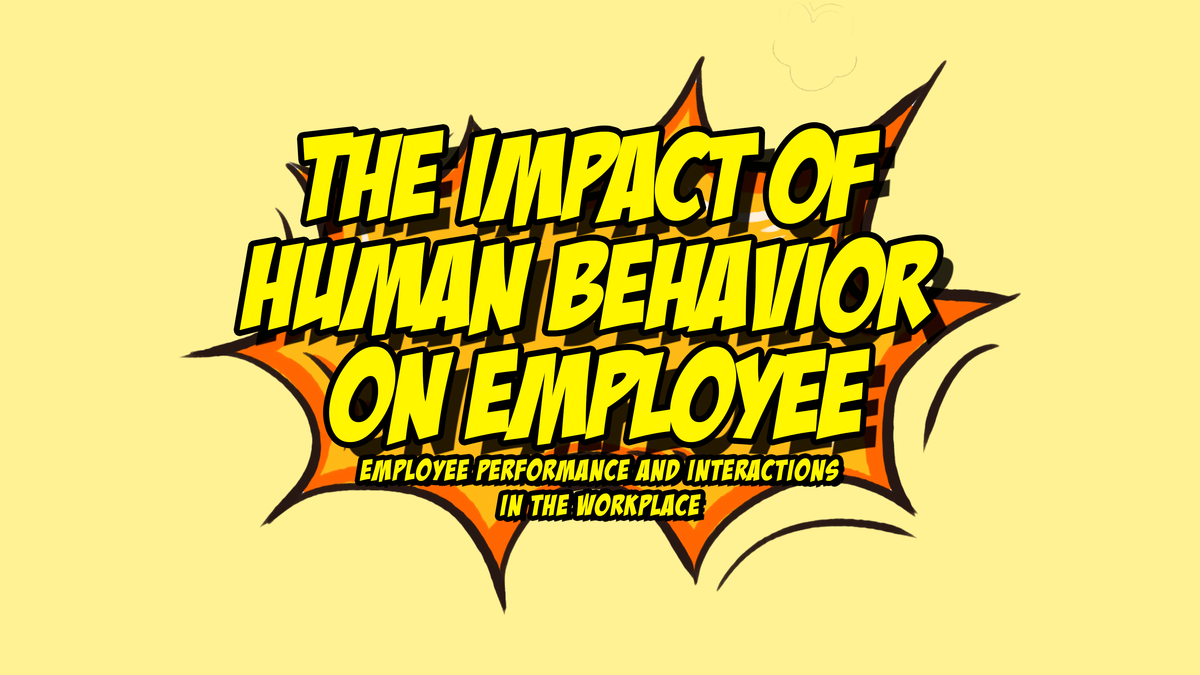Human behavior is a powerful force in shaping workplace dynamics, influencing not only how employees perform but also how they interact with colleagues and customers. Understanding the psychological and social drivers behind behavior is essential for fostering a productive, harmonious, and guest-centric environment. In industries like hospitality, where employee performance and guest interactions are critical to success, the impact of human behavior becomes even more significant.
This interaction will explore how human behavior affects employee performance, team dynamics, and guest interactions—while also giving you an interactive opportunity to reflect on real-world examples.
The Power of Attitude and Motivation
What drives your performance at work?
Performance at work is deeply influenced by an individual's behavior, which is shaped by their attitudes and motivation. Employees who maintain a positive outlook are more likely to be engaged and proactive in their roles. This positivity not only enhances their own productivity but also contributes to creating a supportive and energizing environment for both coworkers and guests. Such employees are more likely to take initiative, solve problems efficiently, and foster teamwork, leading to better overall outcomes for the business. On the other hand, a negative attitude can hinder performance, causing disengagement, increased friction among colleagues, and ultimately leading to reduced customer satisfaction. A lack of motivation or a poor attitude can spiral into poor work quality, which affects the employee's effectiveness and the team's success as a whole.

Photo by Brooke Cagle / Unsplash
Imagine two hotel receptionists. One greets each guest with a smile, is quick to offer assistance, and works well with the housekeeping and concierge teams. The other seems disinterested, does the bare minimum, and rarely interacts with the team. How do you think their behavior affects their performance and the overall guest experience?
Reflection: Employees who feel motivated—whether through internal drive or positive reinforcement—tend to go above and beyond in their roles, contributing to a better guest experience and more cohesive teamwork. Motivation is contagious and can uplift an entire workplace.
Social Dynamics and Team Interactions
How do team relationships affect your performance?
Employee interactions play a crucial role in creating a collaborative and efficient work environment. When relationships are built on trust, respect, and clear communication, the workplace becomes supportive, allowing teams to work together harmoniously. These positive dynamics not only boost morale but also improve productivity, as employees feel valued and empowered to contribute. However, toxic behaviors such as gossip, power struggles, or exclusion can have the opposite effect. These negative interactions breed resentment, lower morale, and disrupt team cohesion, ultimately leading to poor performance. Addressing and preventing such behaviors is essential for maintaining a healthy and productive workplace culture.

You’re part of a team managing a hotel’s daily operations. In one scenario, everyone communicates openly, helps each other during busy shifts, and shares responsibilities. In another, there’s constant friction—some team members hoard tasks while others feel left out. How would these dynamics affect your ability to do your job effectively?
Reflection: Collaboration, trust, and open communication are the building blocks of successful teams. When employees feel valued and supported by their peers, their performance and job satisfaction soar. Poor team dynamics, on the other hand, breed tension and affect not only productivity but also the quality of guest service.
Emotional Intelligence: The Key to Guest and Colleague Relations
How well do you manage your emotions under pressure?
Emotional intelligence (EQ) is a vital skill that directly influences employee performance and guest interactions. EQ involves the ability to recognize, understand, and manage one's emotions, as well as those of others. Employees with high emotional intelligence are better equipped to handle stress, diffuse conflicts, and remain composed in challenging situations. This is particularly important in customer-facing roles, where emotions can run high, and professionalism is key. An employee with strong EQ can empathize with guests, respond thoughtfully to complaints, and turn potential conflicts into positive interactions, ultimately enhancing both customer satisfaction and workplace harmony.

Picture a busy hotel lobby during peak check-in hours. A guest is frustrated due to a booking error, and an employee is juggling multiple tasks. In one scenario, the employee remains calm, listens actively to the guest’s concerns, and finds a solution. In another, the employee gets flustered, reacts defensively, and escalates the conflict. Which response leads to a better outcome?
Reflection: Emotional intelligence is crucial in preventing situations from escalating. Employees who manage their emotions well not only handle guest complaints more effectively but also maintain positive interactions with coworkers. High EQ fosters a culture of empathy, leading to stronger relationships across the workplace.
The Role of Leadership and Company Culture
How does leadership behavior influence your performance?
Leadership behavior and the workplace culture set by management play a crucial role in shaping employee behavior and performance. Leaders who foster open communication, provide regular constructive feedback, and show genuine appreciation for their teams create a positive, supportive environment where employees feel valued and motivated to perform at their best. This type of leadership encourages creativity, collaboration, and loyalty, leading to higher job satisfaction and retention. In contrast, authoritarian or disengaged leadership can stifle employee motivation, reduce productivity, and increase turnover rates. When employees feel undervalued or restricted in their roles, overall performance and team morale decline, harming the organization’s success.

Imagine two managers: one regularly checks in with their team, provides guidance, and acknowledges hard work. The other only steps in when there’s a problem and rarely praises good performance. Which work environment would you be more motivated to excel in?
Reflection: Leadership shapes the behavior and performance of employees. Positive reinforcement, clear communication, and support from management lead to better performance and stronger team relationships. A toxic or indifferent leadership style can hinder growth and lower overall job satisfaction.
Guest Interactions: The Ripple Effect of Employee Behavior
How does your behavior affect guests?
Employees serve as the face of any business, and their behavior has a direct impact on guest satisfaction. A warm, attentive, and helpful employee can create a positive, lasting impression, making guests feel valued and appreciated. This not only enhances the guest experience but can also lead to repeat business and positive word-of-mouth. On the other hand, an employee with a negative or dismissive attitude can easily alienate guests, driving them away. Often, Guest interactions reflect the internal state of the employee—if they are stressed, frustrated, or dissatisfied, it can unintentionally seep into their customer service, negatively affecting the guest experience.

Imagine you’re a guest at a restaurant. In one situation, the server is attentive, cheerful, and makes helpful suggestions. In another, the server is rushed, inattentive, and seems irritated. How does each experience affect your enjoyment of the meal?
Reflection: Guests can sense the attitude of the staff, and their experience is shaped by these interactions. An employee who feels supported, motivated, and emotionally balanced is more likely to provide excellent service, creating loyal guests who return and recommend the establishment to others.
Conclusion: How Can We Improve Workplace Behavior?
The key takeaway is that human behavior significantly impacts not only individual performance but also the overall dynamics within a team and guest satisfaction. Employees who are motivated, emotionally intelligent, and capable of effective teamwork are essential to the success of any business. Their positive energy, collaborative mindset, and ability to manage emotions contribute to a productive work environment and enhanced customer experience. On the contrary, disengaged or emotionally reactive employees can disrupt team harmony and negatively affect customer interactions. Ultimately, cultivating a workplace where human behavior is nurtured is critical for long-term business success.
Take a moment to reflect on your behavior in the workplace. Are there areas where you can improve how you interact with coworkers or guests? Perhaps there are situations where better listening, patience, or empathy could enhance your communication. By recognizing these areas for improvement, you can actively contribute to a more positive and supportive work environment.
Focusing on improving emotional intelligence—such as managing stress and understanding others’ emotions—helps build stronger relationships within your team. Additionally, encouraging leadership to model positive behavior fosters a culture where everyone feels valued. In turn, this leads to higher employee performance, happier guests, and overall business success.



